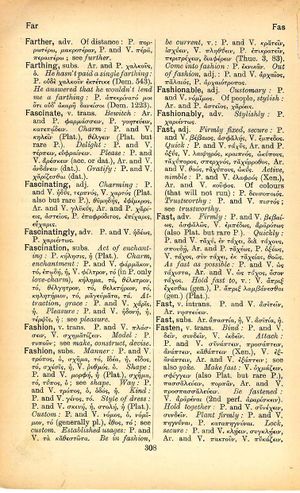fasten: Difference between revisions
τὸ λακωνίζειν πολὺ μᾶλλόν ἐστιν φιλοσοφεῖν ἢ φιλογυμναστεῖν → to behave like a Lacedaemonian is much more to love wisdom than to love gymnastics (Plato, Protagoras 342e6)
(CSV4) |
(de4_2) |
||
| Line 19: | Line 19: | ||
<b class="b2">Fasten up</b> (<b class="b2">a letter, etc.</b>): V. συνδεῖν; see [[seal]]. | <b class="b2">Fasten up</b> (<b class="b2">a letter, etc.</b>): V. συνδεῖν; see [[seal]]. | ||
<b class="b2">Fasten upon</b>: see [[fasten on]]. | <b class="b2">Fasten upon</b>: see [[fasten on]]. | ||
}} | |||
{{GermanLatin | |||
|dela=fasten, [[ieiunium]] servare ([[freiwillig]] [[für]] [[einige]] [[Zeit]] sich der [[Speise]] [[enthalten]], Fasttag [[halten]], [[bes]]. [[aus]] [[Religiosität]]). – [[cibo]] se abstinere (sich der [[Speise]] [[enthalten]], [[bes]]. [[als]] [[Kur]]). – Ist es übh. = [[hungern]], s. d. – in jedem [[Monat]] [[einen]] [[Tag]] s., inediam [[unius]] diei [[per]] singulos menses interponere. – [[Fasten]], das, [[ieiunium]] (die freiwillige Enthaltung der [[Speise]] [[auf]] [[einige]] [[Zeit]], das [[Fasten]]; [[dann]] gleichs. scherzh. übtr. = [[Hunger]]). – [[inedia]] (das Nichtessen, die freiwillige od. gezwungene od. [[durch]] den Körperzustand verursachte Enthaltung [[von]] Speisen). – [[ein]] F. [[anstellen]], [[anordnen]], [[ieiunium]] instituere: [[ein]] F. [[ansagen]], [[ieiunium]] indicere: das F. [[halten]], [[ieiunium]]. | |||
}} | }} | ||
Revision as of 08:59, 15 August 2017
English > Greek (Woodhouse)
v. trans.
Bind: P. and V. δεῖν, συνδεῖν, V. ἐκδεῖν. Attach: P. and V. συνάπτειν. προσάπτειν, ἀνάπτειν, καθάπτειν (Xen.), V. ἐξανάπτειν, Ar. and V. ἐξάπτειν; see also yoke. Make fast: V. ὀχμάζειν, σφίγγειν (also Plat. but rare P.), πασσαλεύειν, πορπᾶν, Ar. and V. προσπασσαλεύειν. Be fastened: V. ἀραρέναι (2nd perf. ἀραρίσκειν). Hold together: P. and V. συνέχειν, συνδεῖν. Plant firmly: P. and V. πηγνύναι, P. καταπηγνύναι. Lock, secure: P. and V. κλῄειν, συγκλῄειν, Ar. and V. πακτοῦν, V. πυκάζειν, Ar. and P. κατακλῄειν. Fit: P. and V. ἐφαρμόζειν, προσαρμόζειν, V. ἁρμόζειν, καθαρμόζειν. Met., attach (blame, etc.): P. and V. προσβάλλειν, προστιθέναι, προσάπτειν, V. ἀνάπτειν, Ar. and P. περιάπτειν, περιτιθέναι. Fasten around: Ar. and P. περιτιθέναι (τί τινι), περιάπτειν (τί τινι), Ar. and V. ἀμφιτιθέναι (τί τινι). Fasten in: Ar. and V. ἐναρμόζειν (τινί τι). Fasten on: P. and V. προσαρμόζειν (τινί τι), προσάπτειν (τινί τι). Fastened on: V. προσμεμηχανημένος. Met., pounce on, attack: P. ἐφίστασθαι; see attack. Whenever (the disease) fastened on the stomach: P. ὅποτε (ὁ πόνος) εἰς τὴν καρδίαν στηρίξειε (Thuc. 2, 49). Fasten up (what has come down): Ar. and V. ἀναστέλλεσθαι. Fasten up (a letter, etc.): V. συνδεῖν; see seal. Fasten upon: see fasten on.
German > Latin
fasten, ieiunium servare (freiwillig für einige Zeit sich der Speise enthalten, Fasttag halten, bes. aus Religiosität). – cibo se abstinere (sich der Speise enthalten, bes. als Kur). – Ist es übh. = hungern, s. d. – in jedem Monat einen Tag s., inediam unius diei per singulos menses interponere. – Fasten, das, ieiunium (die freiwillige Enthaltung der Speise auf einige Zeit, das Fasten; dann gleichs. scherzh. übtr. = Hunger). – inedia (das Nichtessen, die freiwillige od. gezwungene od. durch den Körperzustand verursachte Enthaltung von Speisen). – ein F. anstellen, anordnen, ieiunium instituere: ein F. ansagen, ieiunium indicere: das F. halten, ieiunium.

